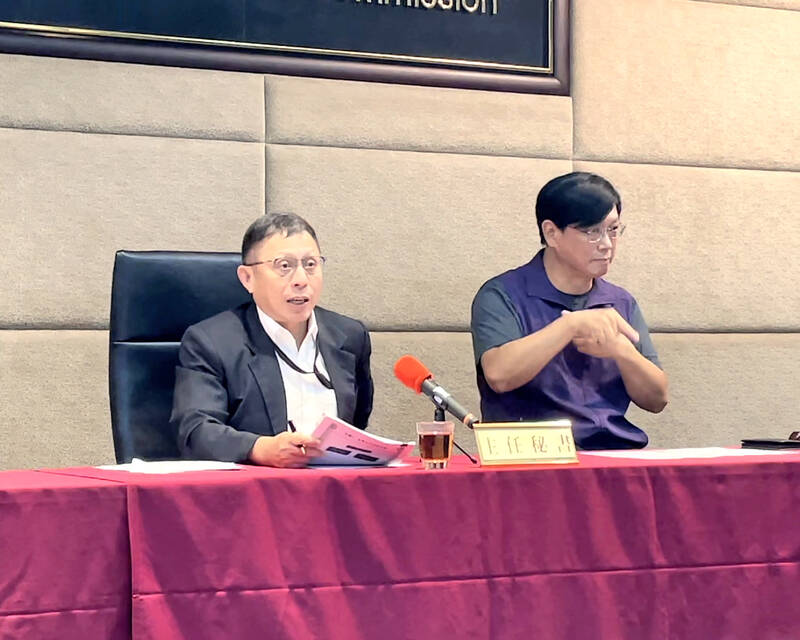People whose telecom access has been restricted or cut multiple times due to their involvement in telecom scams would be listed as high-risk users and would be limited to three telephone number applications for three years, the National Communications Commission (NCC) said yesterday.
The policy is one of the measures to be implemented by the regulator following the passage of the Fraud Hazard Prevention Act (詐欺犯罪危害防制法) in July.
The commission has formed a united front to deter telecom fraud with the National Police Agency (NPA), the National Immigration Agency (NIA) and the High Prosecutors’ Office, NCC Secretary-General Huang Wen-je (黃文哲) told a news conference.

Photo: Lin Chih-yi, Taipei Times
To help prevent telecom services from being used to commit fraud or other crimes, the commission is working with telecoms, the NPA and the NIA to develop a system that would allow telecoms to access the NIA database and the NPA’s 165 anti-fraud hotline, Huang said.
The connections are expected to be operational from November, he said.
If telecoms are notified by police that they need to reauthenticate the identity of an applicant, they can use the databases to verify the information, he said.
“If telecoms are notified multiple times to stop or restrict a user’s access to services due to their involvement in telecom fraud, the nation’s three telecoms must list the user as ‘high risk,’ meaning they would only be allowed to apply for one telephone number or one service from each company for three years,” he said.
The NCC is discussing with NPA officials how many times the telecoms should be notified before they can blacklist a user, Huang said, adding that the matter should be finalized before the end of this year.
Although the measure would not prohibit high-risk users from applying for services from more than one provider, they can expect many questions whenever they apply, NCC officials said.
The act would also tackle fraud arising from the abuse of international roaming services offered by high-risk offshore telecom operators.
People need not use their real names to purchase roaming services online, also known as blackberry cards, nor do they always need to present two forms of identification.
The act requires telecoms to verify whether the person who seeks to activate an international roaming service actually enters Taiwan, and they can do so by accessing the NIA’s database, Huang said.
The NCC is assessing the criteria it would use to determine whether an offshore telecom is a high-risk operator, including the number of times their services are used to commit fraud and whether they sell prepaid services without requiring two forms of ID.
To properly address disputes arising from the use of international roaming services, Huang said that the commission would take into consideration whether the country where a potential high-risk offshore telecom is based in has a mutual legal assistance deal with Taiwan.
“We would also monitor if the services offered by the high-risk offshore telecom were implicated in fraud reported in other countries or by international organizations,” he said.

An essay competition jointly organized by a local writing society and a publisher affiliated with the Chinese Communist Party (CCP) might have contravened the Act Governing Relations Between the People of the Taiwan Area and the Mainland Area (臺灣地區與大陸地區人民關係條例), the Mainland Affairs Council (MAC) said on Thursday. “In this case, the partner organization is clearly an agency under the CCP’s Fujian Provincial Committee,” MAC Deputy Minister and spokesperson Liang Wen-chieh (梁文傑) said at a news briefing in Taipei. “It also involves bringing Taiwanese students to China with all-expenses-paid arrangements to attend award ceremonies and camps,” Liang said. Those two “characteristics” are typically sufficient

A magnitude 5.9 earthquake that struck about 33km off the coast of Hualien City was the "main shock" in a series of quakes in the area, with aftershocks expected over the next three days, the Central Weather Administration (CWA) said yesterday. Prior to the magnitude 5.9 quake shaking most of Taiwan at 6:53pm yesterday, six other earthquakes stronger than a magnitude of 4, starting with a magnitude 5.5 quake at 6:09pm, occurred in the area. CWA Seismological Center Director Wu Chien-fu (吳健富) confirmed that the quakes were all part of the same series and that the magnitude 5.5 temblor was

The brilliant blue waters, thick foliage and bucolic atmosphere on this seemingly idyllic archipelago deep in the Pacific Ocean belie the key role it now plays in a titanic geopolitical struggle. Palau is again on the front line as China, and the US and its allies prepare their forces in an intensifying contest for control over the Asia-Pacific region. The democratic nation of just 17,000 people hosts US-controlled airstrips and soon-to-be-completed radar installations that the US military describes as “critical” to monitoring vast swathes of water and airspace. It is also a key piece of the second island chain, a string of

The Central Weather Administration has issued a heat alert for southeastern Taiwan, warning of temperatures as high as 36°C today, while alerting some coastal areas of strong winds later in the day. Kaohsiung’s Neimen District (內門) and Pingtung County’s Neipu Township (內埔) are under an orange heat alert, which warns of temperatures as high as 36°C for three consecutive days, the CWA said, citing southwest winds. The heat would also extend to Tainan’s Nansi (楠西) and Yujing (玉井) districts, as well as Pingtung’s Gaoshu (高樹), Yanpu (鹽埔) and Majia (瑪家) townships, it said, forecasting highs of up to 36°C in those areas